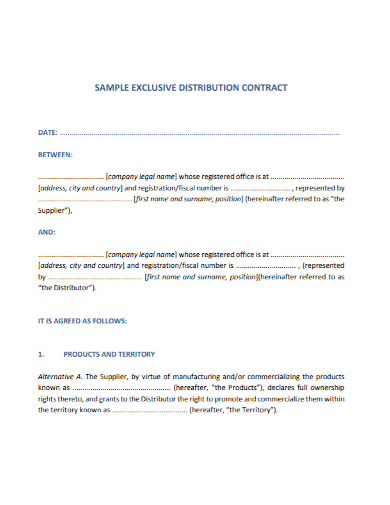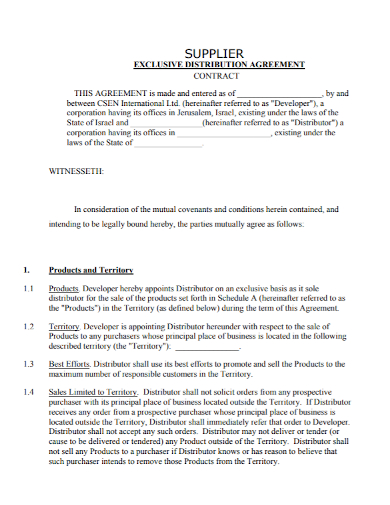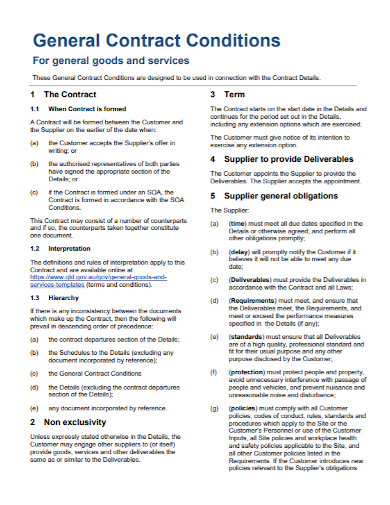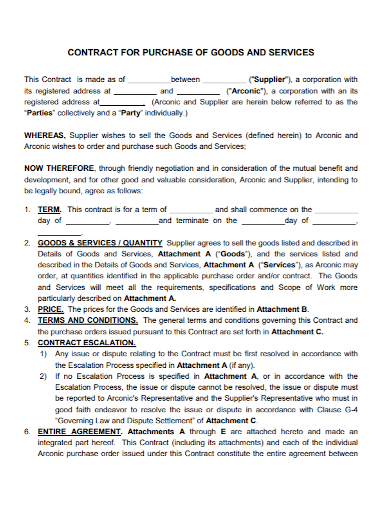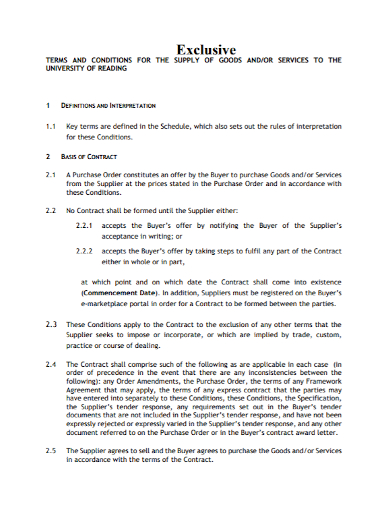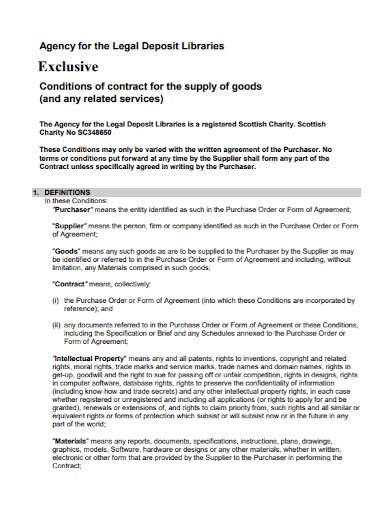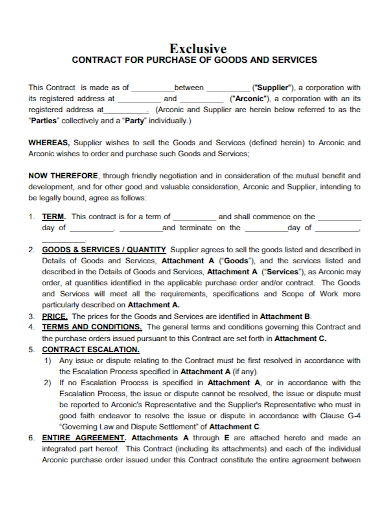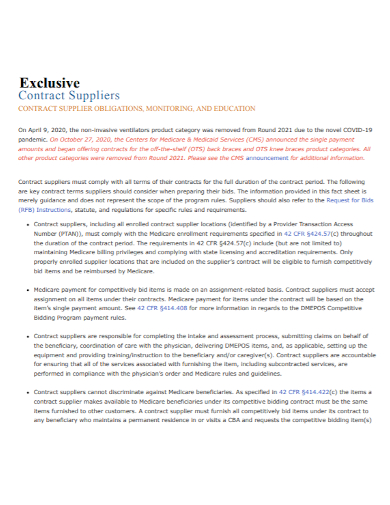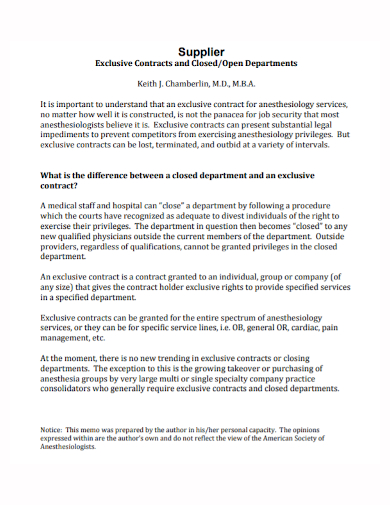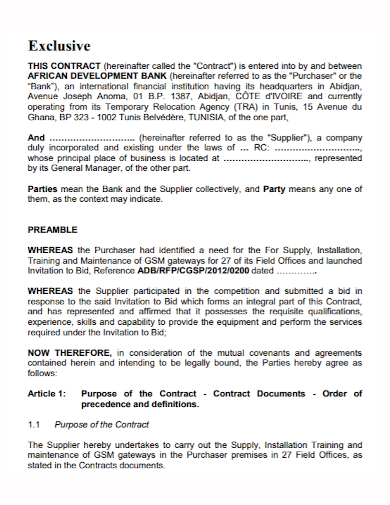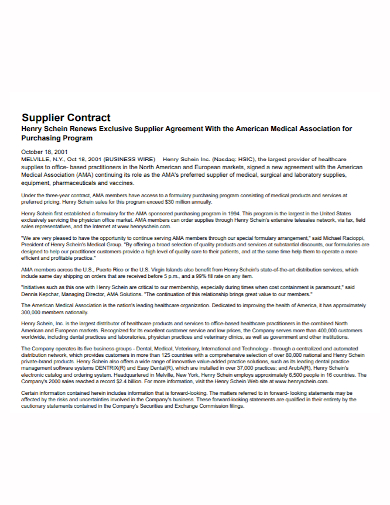Depending on the arrangement between the supplier and the purchaser, different types of supply contracts may exist. A supplier is a person who sells goods to another person, the purchaser. Suppliers and buyers may decide to enter an exclusive supply contract if they want the arrangement to be exclusive. This can include limiting a supplier’s ability to sell the goods in a specific geographic area or through a specific channel, such as online-only; or prohibiting a buyer from purchasing the same or similar goods from other vendors. The Competition and Consumer Act of 2010 is something that both suppliers and buyers should be aware of (the Act). This legislation stipulates that certain exclusive dealings may be illegal.
10+ Exclusive Supplier Contract Samples
Exclusive Supplier refers to a product or service manufacturer or supplier with whom the Head Landlord has formed a Strategic Alliance for the exclusive advertising, supply, and sale of that manufacturer’s or supplier’s products and/or services throughout the Campus. When one party trading with another imposes some form of restriction on the other’s freedom to choose with whom, in what, or where they trade, this is known as an exclusive supply contract (Exclusive Supply Contract).
1. Exclusive Supplier Distribution Contract
2. Exclusive Supplier Agreement Contract
3. General Exclusive Supplier Contract
4. Exclusive Supplier Services Contract
5. Exclusive Supplier Goods and Services Contract
6. Exclusive Agency Supplier Contract
7. Exclusive Supplier Purchase Contract
8. Sample Exclusive Supplier Contract
9. Standard Exclusive Supplier Contract
10. Exclusive Supplier Development Contract
11. Exclusive Supplier Program Contract
Exclusivity
- Exclusive area – As a buyer, you may want to confirm that the supplier is only allowed to sell the specific goods you’re buying to you in your geographic area, and not to other buyers in the same area. You may not want other businesses in your area selling the same products as you. A non-exclusive agreement is a polar opposite. In this case, the supplier may sell the same goods to other customers in the same neighborhood.
- Exclusive channel – You can work out a deal with the supplier about where the goods will be sold. You could sell the items online, at a market, or in a store. It’s possible that the supplier will forbid you from selling through certain channels. It might not allow you to sell goods online, for example.
- Exclusive product – You might be buying a brand new product and being the first to sell it on the market as a buyer. As a result, you might want to insist that the supplier only sells the product to you. This may be the best option if you’re only selling the products online and not in a physical store. If you’re selling the goods at a storefront in a single geographic area, however, the clause should be exclusively based on geographic area, as described above.
Substantial Lessening of Competition
While you may notice that exclusive dealing is taking place, it must significantly reduce market competition in order to violate the law. To determine whether the contract would significantly reduce competition, it must be determined whether:
– There has been a significant impact on overall market competition for a specific product and its substitutes;
– the refusal to supply would significantly reduce consumer access to that type of product;
– Because the business has placed restrictions on the area as a condition of supply, consumers’ ability to purchase a product and its substitutes are severely limited.
FAQs
What is an exclusive area clause?
An exclusive area clause limits the Supplier’s ability to supply the specific goods in question to the Purchaser to a specific geographic area. This type of clause is useful when the Purchaser does not want local competitors to have access to the same goods as the Purchaser.
What is an exclusive product clause?
An exclusive product clause is similar to an exclusive area clause in that it requires the Supplier to sell the product to you exclusively. This is especially true for online businesses that do not have a physical location.
Once you’ve decided to work with a supplier, you’ll need to see if any exclusivity agreements exist, and if so, whether they have the potential to significantly reduce competition. In any case, having a contract between you and the supplier to reflect the exclusive terms in a supply agreement is a good idea. These terms include supplying goods to a limited geographic area, supplying goods exclusively to you, and supplying goods through an exclusive channel such as the internet or a storefront. You should also be aware of the terms that a supplier may include in a contract that they provide to you.
Related Posts
FREE 14+ Sample Music Concert Proposal Templates in MS Word | Google Docs | Pages | PDF
FREE 10+ Security Guard Contract Samples in PDF | MS Word
FREE 10+ Assurance Agreement Samples In MS Word | Google Docs | Apple Pages | PDF
FREE 10+ Option to Purchase Agreement Samples in MS Word | Apple Pages | PDF
FREE 26+ Curriculum Form Samples in MS Word | PDF
FREE 20+ Cleaning Service Proposal Samples in PDF | MS Word
FREE 29+ Sample Loan Application Form Templates in MS Word | PDF
FREE 10+ Event Venue Contract Samples in PDF | MS Word | Pages | Google Docs
FREE 10+ SBAR Samples in PDF | DOC
FREE 12+ Music Band Contract Templates in PDF | MS Word
FREE 10+ HVAC Maintenance Contract Samples in PDF | MS Word
FREE 10+ Social Media Marketing Contract Samples in MS Word | PDF
FREE 10+ Wholesale Assignment Contract Samples in PDF
FREE 18+ Financial Proposal Samples in PDF | MS Word | Google Docs | Pages
FREE 10+ Feasibility Study Samples in PDF

